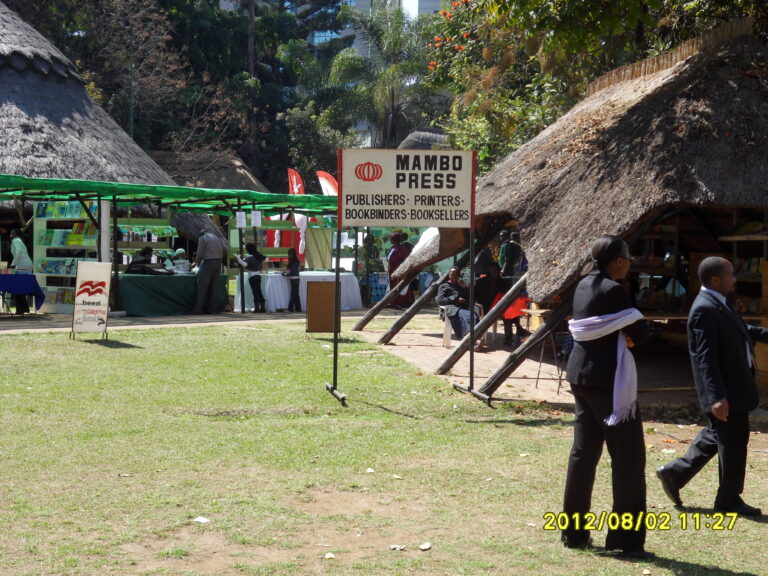Only three years after a protracted war of liberation that forced millions of children to skip school, the Zimbabwe International Book Fair (ZIBF) emerged on the young nation’s book marketing scene when the country needed it most. Back then in 1983 millions of children were returning to school and hundreds of newly liberated adults were eager to read and learn more about the world. With books so much in demand, the rise of ZIBF was so dramatic that by the early nineties, it was one of the premier book fairs in Africa. Today, the ZIBF is a pale shadow of its former, but in a country with such a deep-rooted reading culture, there is still hope that one day it will retain its past glory.
The Glory Days
During its heyday in the 1980s and 90s, when there was no internet or digital technology, the ZIBF was a great once-in-a-year opportunity for different local stakeholders in the book publishing industry to establish linkages and partnerships. Every annual fair used to attract many renowned authors, publishers, and book buyers from around the world. Besides the book trading, the fair was equally famous for its sideshows like reading competitions for children, live literature, poetry, and many other exciting literary events. In 1997, the ZIBF scored a first when it became the first organization in Africa to receive the Principal Prince Claus Award for Culture and Development.
‘It was a big and exciting event and everyone from authors, publishers, librarians, and students always looked forward to the next fair”, remembers Tinashe Machingura, a retired high school librarian, “The ZIBF helped in nurturing a strong reading and writing culture in Zimbabwe and it also boosted our literacy rate which is still one the highest in Africa”.
Hard times for the ZIBF
The rise of the ZIBF might have been sudden, but its decline that began in the early 2000s was gradual and predictable. At that time, Zimbabwe was embarking on a controversial land reform that saw some white-owned farms being subdivided and allocated out to thousands of landless blacks. The land reform and the sanctions from Western countries that followed it severely affected all sectors of Zimbabwe’s agro-based economy including the publishing industry. During those hyperinflationary years, few people had spare money to buy books, many prominent publishers and bookshops closed shop while major fair sponsors withdrew their funding.
“It was a gloomy time for the book industry” Tineyi Muchena who used to run a small bookstore in Harare explained. “We had stockpiles of books that were piling in our store room without any buyers”.
In the same decade, the global technological and digital revolution saw many authors changing the way they write while book consumers turned to digital gadgets for reading. This revolution coupled with rampant piracy negatively impacted the book publishing industry around the world and likewise, the ZIBF was not spared the damage. One of the books most affected by this trend is the Bible. In Zimbabwean churches, many Christians including priests and pastors now read the Holy Book from their smartphones.
By 2008, the challenges confronting the ZIBF were so many that it failed to organize the fair for the first time that year and the following. In the following couple of years, the fair was now evidently on the decline and in the next couple of years, it staged what some people called “mini book fairs” just to keep the spirit of the ZIBF alive. In 2020 and 2021 the Covid 19 outbreak haunted the two editions and inevitably, they were both cancelled.
ZIBF’s future and dilemma
Despite the economic challenges facing the country. The book-reading and writing culture is still very strong among Zimbabweans and of late the country is experiencing an increase in the number of writers, publishers, and bookshops. In the last two years after the COVID-19 outbreak, ZIBF organized two relatively successful fairs compared to many other years in the last decade or so. To keep the tradition of the book fair alive, the ZIBF is also organizing smaller localized book fairs in other centers outside the capital Harare like Masvingo, Mutare, and Bulawayo. More other fairs, festivals, or platforms that complement the work of the ZIBF like The Harare Open Book Festival (HOBF) and Amabooks are another ever-present reminder of the ZIBF.
The interim CEO of the ZIBF. Memory Chirere is optimistic that the annual book fair will one day regain its lost glitz since the reading culture is still alive in Zimbabwe. He said despite the advances in technology the printed book is still part of Zimbabwe’s reading culture for many years to come. Memory, who is also an established writer himself attributes the challenges facing the book industry in Zimbabwe to the current economic situation in the country.
“Many prominent Zimbabwean publishing houses are folding because they cannot not survive in the current subdued economic situation and our traditional sponsors have understandably no money to spare” he said. “As for this year we have not yet fixed the dates of the annual ZIBF but if the economy improves, you will certainly witness a rejuvenated the ZIBF in the future”.
In one way or another, the ZIBF which is held annually in the sprawling Harare Gardens has played a big role in inspiring Zimbabweans to value education. Thanks to ZIBF, today most Zimbabwean families prioritize education above everything else and many parents go out of their way to ensure that their children get the best possible education. In Africa, Zimbabwe has one of the highest literacy rates in Africa and its well-trained professionals are highly regarded in many countries around the world.
Meanwhile, there is no doubt that educated Zimbabweans understand how technology and the internet have become the new normal in book publishing and reading. Intelligibly, many authors are adapting to the new normal by utilizing online book publishing platforms and online shops.
“Reading from a tablet might be cool and convenient but as an author and an avid reader, I still feel more relaxed and focused when holding a real book in my hands”, said Charles Kungwenge, a Zimbabwean Law lecturer and writer with many titles on Amazon, “Nevertheless, the ZIBF has a big task ahead of keeping printed books and the ZIBF itself relevant among a technology-savvy generation”.
Author: Cecil Dzwowa
Image: By Gerard van de Bruinhorst – Sent by email by the photographer., CC BY-SA 4.0, https://commons.wikimedia.org/w/index.php?curid=37334601

